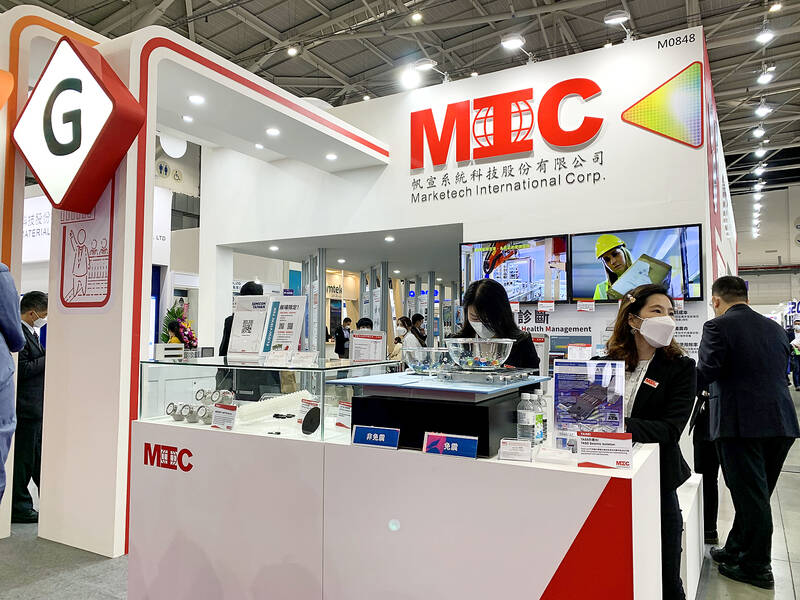Marketech International Corp (帆宣), a semiconductor and display panel equipment supplier and distributor, yesterday said it is to launch a subsidiary in Dresden, Germany, as its major customer, Taiwan Semiconductor Manufacturing Co (TSMC, 台積電) last month announced it is building its first European fab in the area.
TSMC is constructing a 12-inch wafer fab in Dresden to produce mainly car chips. The world’s largest contract chipmaker plans to build three advanced fabs in Arizona and two in Kumamoto, Japan.
Marketech has set up US and Japan subsidiaries to provide services to TSMC in those countries. It also set up an office in the Czech Republic last year to collect information about the local investment environment.

Photo: Grace Hung, Taipei Time
Marketech plans to hire about 125 employees in Europe — about half the size of its US subsidiary, company president Scott Lin (林育業) said yesterday.
The US subsidiary remains in the red due to higher labor costs, he said.
The company has slowed down the construction of a new factory in Tainan due to weaker-than-expected demand from display panel customers, he said.
Lin added that the company expects the NT$1.9 billion (US$59.2 million) Tainan factory would become operational in the second quarter of next year.
Marketech’s revenue in the first seven months of the year grew 10.42 percent annually to NT$34.92 billion.
The company expects revenue and net profit to show moderate growth in the second half of the year, Lin said.
However, the company projects more marked growth in revenue and profit next year, given an expected more solid recovery in the semiconductor industry and the contribution of the new product lineup, he said.
Marketech is planning to tap into the advanced packaging industry by supplying chip-on-wafer-on-substrate (CoWoS) equipment, he said.
It is collaborating with a Japanese company to offer CoWoS equipment from next year, he added.

WEAKER ACTIVITY: The sharpest deterioration was seen in the electronics and optical components sector, with the production index falling 13.2 points to 44.5 Taiwan’s manufacturing sector last month contracted for a second consecutive month, with the purchasing managers’ index (PMI) slipping to 48, reflecting ongoing caution over trade uncertainties, the Chung-Hua Institution for Economic Research (CIER, 中華經濟研究院) said yesterday. The decline reflects growing caution among companies amid uncertainty surrounding US tariffs, semiconductor duties and automotive import levies, and it is also likely linked to fading front-loading activity, CIER president Lien Hsien-ming (連賢明) said. “Some clients have started shifting orders to Southeast Asian countries where tariff regimes are already clear,” Lien told a news conference. Firms across the supply chain are also lowering stock levels to mitigate

IN THE AIR: While most companies said they were committed to North American operations, some added that production and costs would depend on the outcome of a US trade probe Leading local contract electronics makers Wistron Corp (緯創), Quanta Computer Inc (廣達), Inventec Corp (英業達) and Compal Electronics Inc (仁寶) are to maintain their North American expansion plans, despite Washington’s 20 percent tariff on Taiwanese goods. Wistron said it has long maintained a presence in the US, while distributing production across Taiwan, North America, Southeast Asia and Europe. The company is in talks with customers to align capacity with their site preferences, a company official told the Taipei Times by telephone on Friday. The company is still in talks with clients over who would bear the tariff costs, with the outcome pending further

NEGOTIATIONS: Semiconductors play an outsized role in Taiwan’s industrial and economic development and are a major driver of the Taiwan-US trade imbalance With US President Donald Trump threatening to impose tariffs on semiconductors, Taiwan is expected to face a significant challenge, as information and communications technology (ICT) products account for more than 70 percent of its exports to the US, Chung-Hua Institution for Economic Research (CIER, 中華經濟研究院) president Lien Hsien-ming (連賢明) said on Friday. Compared with other countries, semiconductors play a disproportionately large role in Taiwan’s industrial and economic development, Lien said. As the sixth-largest contributor to the US trade deficit, Taiwan recorded a US$73.9 billion trade surplus with the US last year — up from US$47.8 billion in 2023 — driven by strong

RESHAPING COMMERCE: Major industrialized economies accepted 15 percent duties on their products, while charges on items from Mexico, Canada and China are even bigger US President Donald Trump has unveiled a slew of new tariffs that boosted the average US rate on goods from across the world, forging ahead with his turbulent effort to reshape international commerce. The baseline rates for many trading partners remain unchanged at 10 percent from the duties Trump imposed in April, easing the worst fears of investors after the president had previously said they could double. Yet his move to raise tariffs on some Canadian goods to 35 percent threatens to inject fresh tensions into an already strained relationship, while nations such as Switzerland and New Zealand also saw increased